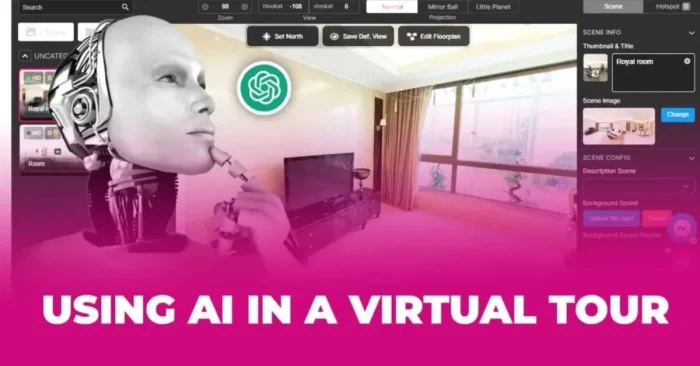Overview
AI tools for virtual tours are transforming how people explore destinations, museums, real estate, and cultural sites from anywhere in the world. These tools use artificial intelligence to create immersive, interactive, and personalized experiences. They integrate technologies like 360-degree imaging, VR, AR, and real-time data analysis to enhance engagement. AI can act as a virtual guide, answering questions, suggesting paths, or adapting the tour to a visitor’s preferences. From tourism and education to real estate marketing, AI-driven virtual tours make exploration more accessible, cost-effective, and engaging, bridging the gap between physical presence and digital experience.
1. AI in Personalized Tour Experiences
AI analyzes user preferences, location interests, and past interactions to customize virtual tours. For example, history enthusiasts may be shown detailed cultural insights, while casual visitors receive simplified highlights. This personalization ensures every user enjoys a unique and relevant journey tailored to their needs.
2. AI-Powered Virtual Guides
AI chatbots and avatars act as real-time guides, providing explanations, answering questions, and engaging users during tours. These guides enhance learning, simulate human interaction, and make the virtual experience feel more authentic, whether for museums, real estate, or travel destinations.
3. AI in 360-Degree & VR Integration
AI enhances 360-degree videos and VR tours by stitching images seamlessly, correcting distortions, and optimizing views. Visitors can freely explore spaces as if they were physically present, making it ideal for real estate, exhibitions, and travel destinations worldwide.
4. AI for Language Translation
AI-powered multilingual support allows users to enjoy virtual tours in their preferred language. Real-time translation ensures accessibility for global audiences, breaking down language barriers and making cultural or educational tours inclusive for people worldwide.
5. AI in Real Estate Virtual Tours
Real estate agents use AI-driven virtual tours to showcase properties with accurate details, layout visualizations, and interactive features. AI can also recommend similar homes, provide mortgage calculators, and predict buyer interests, improving the property search experience.
6. AI for Educational Virtual Tours
In education, AI virtual tours allow students to explore historical landmarks, museums, or scientific sites interactively. AI provides context-rich explanations, quizzes, and adaptive learning paths, turning virtual field trips into powerful, engaging learning experiences for all age groups.
7. AI in Tourism & Cultural Heritage
Tourism boards and cultural institutions use AI-powered tours to promote destinations and preserve heritage. Visitors can explore ancient ruins, famous landmarks, or art galleries virtually, with AI offering historical context and storytelling to make experiences more meaningful and memorable.
8. AI for Accessibility & Inclusion
AI ensures virtual tours are accessible to people with disabilities by providing voice narration, descriptive text, and gesture recognition. These features create inclusive experiences, ensuring everyone can enjoy tours regardless of physical or cognitive limitations.
9. AI in Data Analytics for Virtual Tours
AI analyzes user behavior during tours—such as areas of interest, time spent, or engagement level—to provide insights for organizers. These analytics help improve future tours, optimize content, and increase user satisfaction while also supporting targeted marketing.
10. AI for Hybrid Experiences
AI enables hybrid tours where physical and virtual elements blend together. For example, on-site visitors may access AI-powered AR features, while remote users experience the same exhibit online. This integration expands reach and ensures engaging experiences for both audiences.
(FAQs)
Q1: Can AI virtual tours replace physical visits?
No, AI enhances digital exploration but physical visits still offer sensory and immersive experiences that cannot be fully replicated.
Q2: Do AI-powered virtual tours require VR headsets?
Not always. Many tours are accessible via smartphones, tablets, or computers, though VR headsets enhance immersion significantly.
Q3: Are AI virtual tours useful for businesses?
Yes, they help real estate, tourism, and education industries reach wider audiences, reduce costs, and improve engagement.
Learn More About AI Course https://buhave.com/courses/learn/ai/






